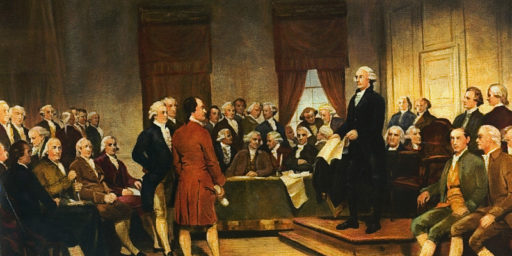In Plame Leaks, Long Shadows
The Washington Post fronts (albeit below the fold) a story by Jim VandeHei and Mike Allen on the Valerie Plame affair that contains no news whatsoever despite taking up three pages on the Web and several column inches and the entirety of an inside page (A15) in the print edition.
In Plame Leaks, Long Shadows (WaPo, A1)
Karl Rove had a secret. In public, he was masterminding President Bush’s reelection and brushing off suggestions he had played any part in an unfolding drama: the unmasking of CIA operative Valerie Plame. In private, the senior White House adviser was meeting, on five occasions, with federal prosecutors to tell what he knew about the matter.
The story he would tell prosecutors did not seem to square with the White House’s denial that it had played any role in one of the most famous leaks since Watergate. Rove told prosecutors he had discussed Plame in passing with at least two reporters, including the columnist who eventually revealed her name and role in a secret mission that would raise questions about Bush’s case for war against Iraq. At the same time, other White House officials were whispering about Plame, too.
It is now clear: There has been an element of pretense to the White House strategy of dealing with the Plame case since the earliest days of the saga. Revelations emerging slowly at first, and in a rapid cascade over the past several days, have made plain that many important pieces of the puzzle were not so mysterious to Rove and others inside the Bush administration. White House officials were aware of Plame and her husband’s potentially damaging charge that Bush was “twisting” intelligence about Iraq’s nuclear ambitions well before the episode evolved into Washington’s latest scandal.
But as the story hurtles toward a conclusion sometime this year, there are several elements that remain uncertain. The most important — did anyone commit a crime?
This article, based on interviews with lawyers and officials involved in the case, is an effort to step back from the rapidly unfolding events of recent weeks and clarify what is known about the Plame affair and what key factors are still obscure. Those people declined to be identified by name because special prosecutor Patrick J. Fitzgerald has asked that closed-door proceedings not be discussed.
So, the purpose of the story was to flesh out the uncertain elements and to decipher whether someone committed a crime. The closing paragraph of the story?
Yet much of the case remains a mystery. Did the White House leak the identity of a CIA operative? Is it a crime? Did Bush have any knowledge of it? Will Fitzgerald have spent this much time pressuring officials and reporters and not deliver an indictment? Those questions may be answered soon, as the grand jury’s term is set to expire in October.
That’s a lot of newspaper space to wind up with the same questions with which the reporters started.





The purpose of a newspaper is to sell advertisement space. If a newspaper is able to sell ads while providing no news whatsoever, nothing but imaginary filler, it will do so. In this case, that is what has happened. Newspapers can’t afford to pay competent help so they scrape up whatever they can find to write whatever features can’t be cheaply bought from wire services.
Why is a web page called ‘outside the beltway’ concerned with what is printed in the politcs section of the Washington Post?